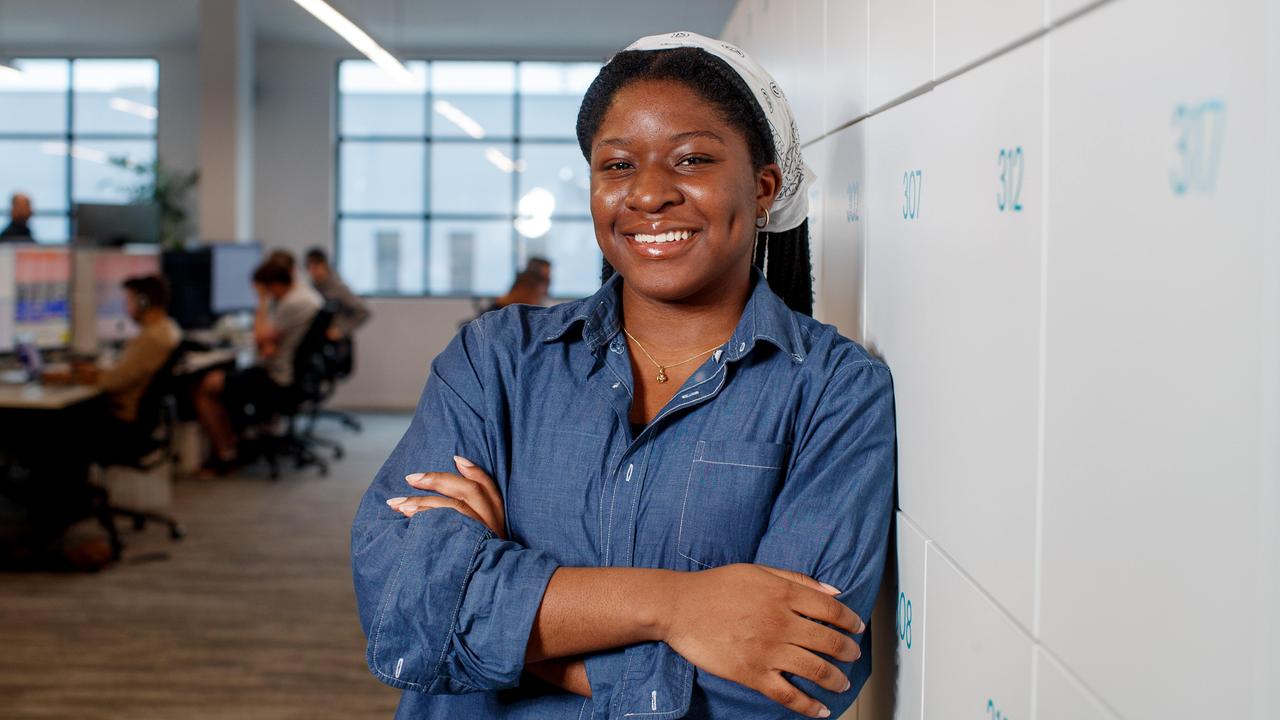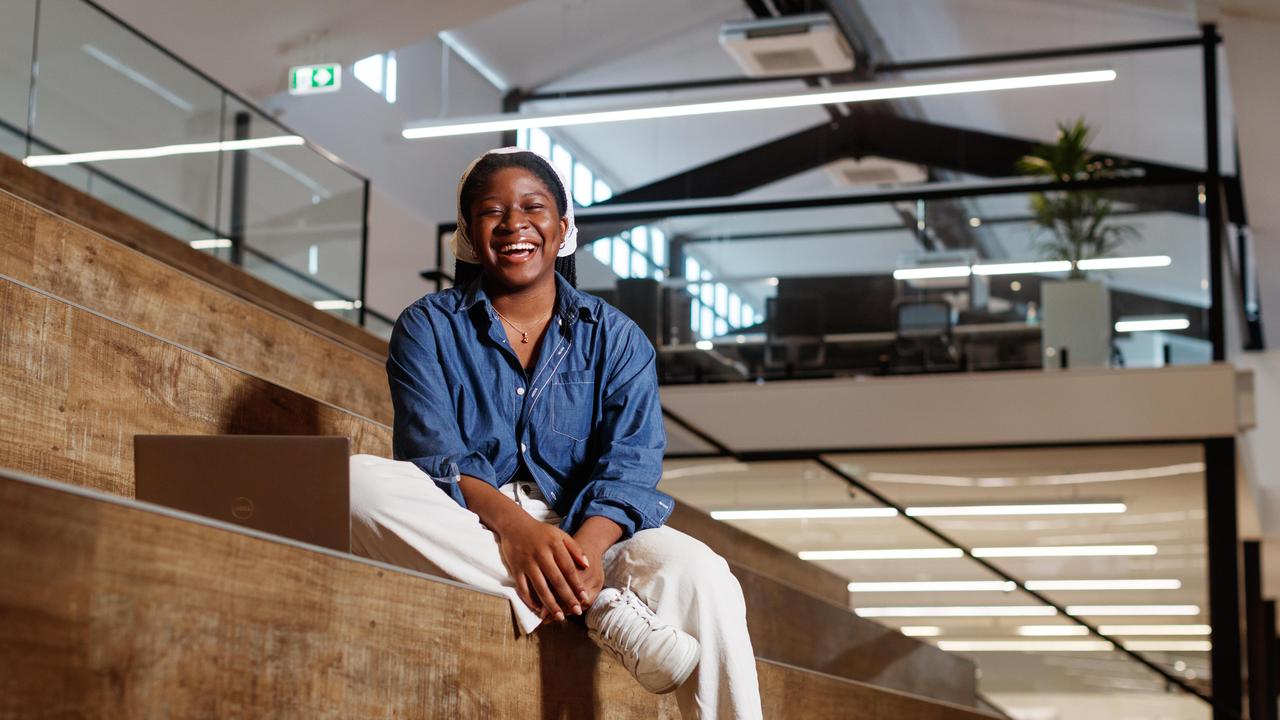WiseTech billionaire offers students $300k to complete a degree
An Australian tech billionaire sends staff to university, covers their HECS debt and builds up a share portfolio on their behalf. But that’s not all.

Business
Don't miss out on the headlines from Business. Followed categories will be added to My News.
WiseTech’s billionaire founder Richard White has set himself a mission to revolutionise university study, doubling the intake for the tech darling’s “earn and learn” program and making it available to all companies in effort to help solve Australia’s tech worker crisis.
The program, launched last year, pays students the equivalent of $300,000 to complete a university degree while working at WiseTech, where they are also eligible for the company’s employee share program.
The catch is, instead of taking three years to complete a degree, it takes four, given students are also working at WiseTech, the logistics software company Mr White built into a $31.23bn ASX titan.
But he says the extra year’s study is time well spent, with it accelerating a graduate’s career.
“We pay for their HECS, they get no HECS debt, and as they’re going through, they build up a share portfolio which vests after they graduate,” Mr White said.
“That means instead of having three years worth of effort and no pay, and then a HECS debt, they get four years’ worth of paid service and their pay is rising as their skill rises, and they end up with a share portfolio next step … and a career.”
Australia will need an extra 300,000 tech workers by the end of the decade. Universities are struggling to meet this demand, producing about 6000 science, technology, engineering and mathematics (STEM) graduates a year.

The shortfall threatens to stall Australia’s transition into the so-called “smart economy” and reap the benefits from the widespread adoption of artificial intelligence, which the Albanese government expects will inject an extra $600bn a year into the national economy by 2030.
It also intensifies the war for talent, but companies have been stepping up to try to fill the shortage. Microsoft has committed to train an extra 300,000 students to “succeed in the digital economy” via its global skills program and in a collaboration with TAFE NSW.
But Microsoft’s program focuses mainly on micro-credentials, whereas WiseTech’s model is catered to degree-level study and has been growing exponentially.
The earn and learn program recruited 30 students last year and 52 this year. Mr White is planning to lift the intake to 100 for 2025, with applications opening in June.
But he said WiseTech can’t fill the skills gap on its own, so it will open source the program to allow more companies to replicate it.
“I’m trying to build something vastly different in the education system that has enormous value creation, and avoids a lot of the fundamental pain that we create for university.

“Not everybody’s good for university, right? It’s not like everybody is going to go to university, but we’re talking about people that are going to be much better off because of this hybrid arrangement.”
Mr White said the program was already beginning to pay off — both for WiseTech and students.
“The first cohort which we took on last January, after one year were performing better than graduates with a three year university degree. It’s actually a modification of the university model to make it much more effective.
“If it’s true that after one year, high school students are performing better than university graduates at the job. And then imagine what that looks like after four years. Isn’t that the goal of education, to crack these astoundingly good people? I mean, I do think we’re onto something with it.”
The program is centred on a concept known as the flipped classroom, whereby students learn theory at home and do practical work in the classroom, or in WiseTech’s case, the office.
Mr White, who has a love of guitars, likens the approach to if you taught a musician only theory for three years and then asked them to play an instrument.

“You know, they're not going to be able to play anything because they've never practised on an instrument. Musicians practise the actual instrument three, four, five hours a day, and learn theory maybe one hour per day. That’s how you become fluent.
“When you’re in WiseTech, you’re sitting next to professionals. We typically have a ratio of two or three senior professionals to one student. And they’re sitting there and they’re realising that their stuff is going to be in production in three months’ time and they’re sitting next to people who are experts who can verify what they’re doing and push them to be better,” Mr White said.
“Their learning process is massively faster.”
But industry and government must not just rely on high school leavers to fill the tech shortage, particularly in attracting female workers.
Mr White — who doesn’t like to use the STEM tag — says encouragement must start at primary school. To this end, WiseTech has partnered with Grok Academy — a separate entity to fellow tech billionaire Mike Cannon-Brooke’s investment Grok Ventures — which focuses on computer education.
“I’m trying very hard never to say the word STEM anymore because I think it’s like a battering ram. People have been beaten over the head with STEM for the last 10 years even though during this time, participation rates in science and maths have fallen,” Mr White said.
“But equally the results have fallen as well. This is not a good look.
“So rather than focus on academic results — although that will actually be at the core of this — we’re focusing on trying to create curiosity in people and interest and learning that has nothing to do with the academic pursuit per se, even though that’s what it ends up being. It’s more to do with how do I use technology? How do I create fun things? How do I build things? How do I use that capability?”
WiseTech donates 1 per cent of its pre-tax profit — which totalled $212.2m last year — to the Grok Academy.
Following its sponsorship, Mr White said the number of students accessing the Grok Academy platform in 2023 was 82 per cent higher, while 40 per cent were female.
More Coverage
Originally published as WiseTech billionaire offers students $300k to complete a degree








